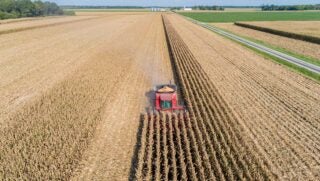When service members leave the military, they often find themselves struggling to determine what kind of career they want post-service. Many have found agriculture to be a fit, but entering — and embracing — this industry is not without its obstacles.
An American Farmland Trust report titled, Veteran Women in Agriculture: A Regional Needs Assessment Women, found that many women coming out of the military felt pushed into roles as caregivers, often as mothers, a burden that makes it difficult to navigate professional aspirations and financial needs. The report also noted that factors such as geography, resource access, and male-centric machinery designs could impact how women are able to succeed in farming and ranching.
For two female veterans, Ta’ Neshia Renae’ and Kim Pham, they found a calling from agriculture that provided them with work that they felt aligned with their values.
Female veterans are a small, niche group in the agricultural sector, perhaps easily overlooked by many. However, Pham says there is a growing interest from veterans, women in particular, who are interested in working in farming and ranching.
Pham is the program manager for the Veterans Conservation Corps, which is nestled within the Counseling and Wellness program at the Washington State Department of Veterans Affairs. A veteran from the Navy, Pham spent her service working on nuclear reactors. Upon finishing her service, she felt uncertain about what she wanted to do for work but knew she did not want to continue being a nuclear engineer.
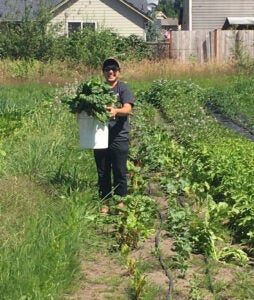
Drawn to the outdoors, Pham joined the department of Veterans Affairs to learn more about conservation and agriculture, the two main divisions the VCC facilitates. Pham felt called to continue her service in some capacity after being in the Navy, and she says that contributing to the program fulfilled that desire while also being a springboard to new passions and interests.
The opportunities provided to Pham through the program deepened her interest in agriculture, and she is excited to carve out a unique role for herself in the sector.
Reflecting on her life, Pham talks of constantly feeling out of place — as a woman in the military, as a woman in engineering, as queer in our heteronormative society, as a minority, and in many other ways. However, Pham credits her experiences with allowing her to connect with others and see beyond limiting stereotypes.
In her current line of work, she interacts with people from different walks of life, and Pham uses her military experience to help her navigate working with such a variety of people. For example, a lot of those who Pham works with are men, but considering that she has ample experience working in a male-dominated field as a female nuclear engineer in the Navy, she is comfortable and confident in her work in the agricultural space.
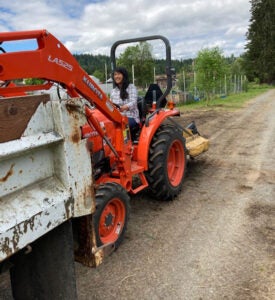
Learning to navigate political identities and affiliations was also something she learned in her military service that she says serves her well now when speaking with farmers and growers who may also vary widely in their political stances. Pham is a project partner of American Farmland Trust’s Women for the Land initiative, which is a suite of services and activities that help women farm and ranch owners and operators make the best decisions for their businesses and their land. She hopes to nurture a newfound interest in beekeeping, while continuing to provide resources and opportunities to others who are interested in agriculture.
Many veterans, traumatized from service and suffering from PTSD, are seeking rejuvenating and healing practices in their civilian lives, and Pham has seen firsthand how engaging in farming and tending to the land can provide a healing grounds for veterans. Pham believes that many of the veterans who seek farming as a prospective career do so because of their desire to continue serving in some capacity, and sees how by practicing farming, “You heal the land, you heal yourself, and you heal your community.”
This belief that agriculture provides healing and solace — especially for veterans — is not unique to Pham, it was also the appeal for Renae’, who served in the Air Force and underwent difficult circumstances during her service.
After leaving the military, Renae’ was a stay-at-home mother for six years and went on to pursue a bachelor’s in Human Services before working in the public school system and starting her own business as a mobile notary and signing agent. When the pandemic hit, she used that time to further explore what her values were and where she wanted her life to go.
Struggling with PTSD and trauma, Renae’ decided to seek healing through nature. She started thinking more about nutrition and her health, and decided to try her hand at gardening in her apartment. From there, her interest in growing plants blossomed into something more — Renae’ discovered a greater desire to grow flowers and raise bees and connect with farmland.
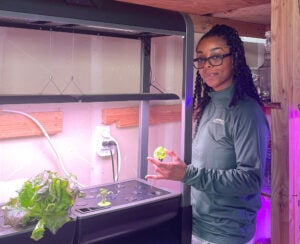
She sought resources through Rogue Farm Corps, which provided hands-on experience for her. From there, she gained access to more resources through Women for the Land, an initiative launched by American Farmland Trust to promote and assist female farmers.
In her attempt to become a full-time grower, Renae’ has run into a multitude of problems. Access to affordable land is an issue, and generating the capital to invest in land, equipment, and other resources is a huge hurdle.
Some of the challenges Renae’ faced as a veteran also followed her to her pursuit of an agricultural career. Because both military and agricultural operators are perceived as being predominantly White males, Renae’ often fields questions about her experiences and whether those perceptions are detrimental to her ability to succeed in these sectors.
However, the tenacity and resilience that she has from being a Black person, a woman, and a veteran all drive her toward her goals of one day owning and running her own flower farm.
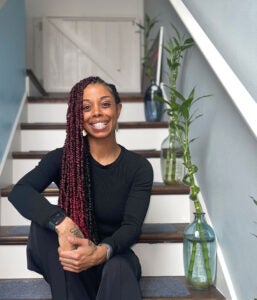
Both Renae’ and Pham had unconventional journeys into agriculture. And neither really thought that they would ever choose a career in this space, but both have undoubtedly grown passionate and ambitious about it. These women agree that the future of agriculture is changing, and both hope to see that there is more equitable access for all people to grow food in the future.
They believe in the power of bringing feminine energy to this historically male-dominated industry, believing that the nurturing, caring nature of femininity will provide a foundation for a more sustainable, regenerative practice of farming.
This article was published by AGDAILY on behalf of American Farmland Trust.
Liza Thuy Nguyen serves as the 2023 American Farmland Trust Agriculture Communications Intern at AGDAILY, with a focus on helping to amplify diversity and minority voices in agriculture. Liza is originally from Anaheim, California, and attended the University of California, Davis, as a first-generation college student. She received a bachelor’s degree in genetics and genomics and went on to earn a master’s in horticulture from Penn State.


